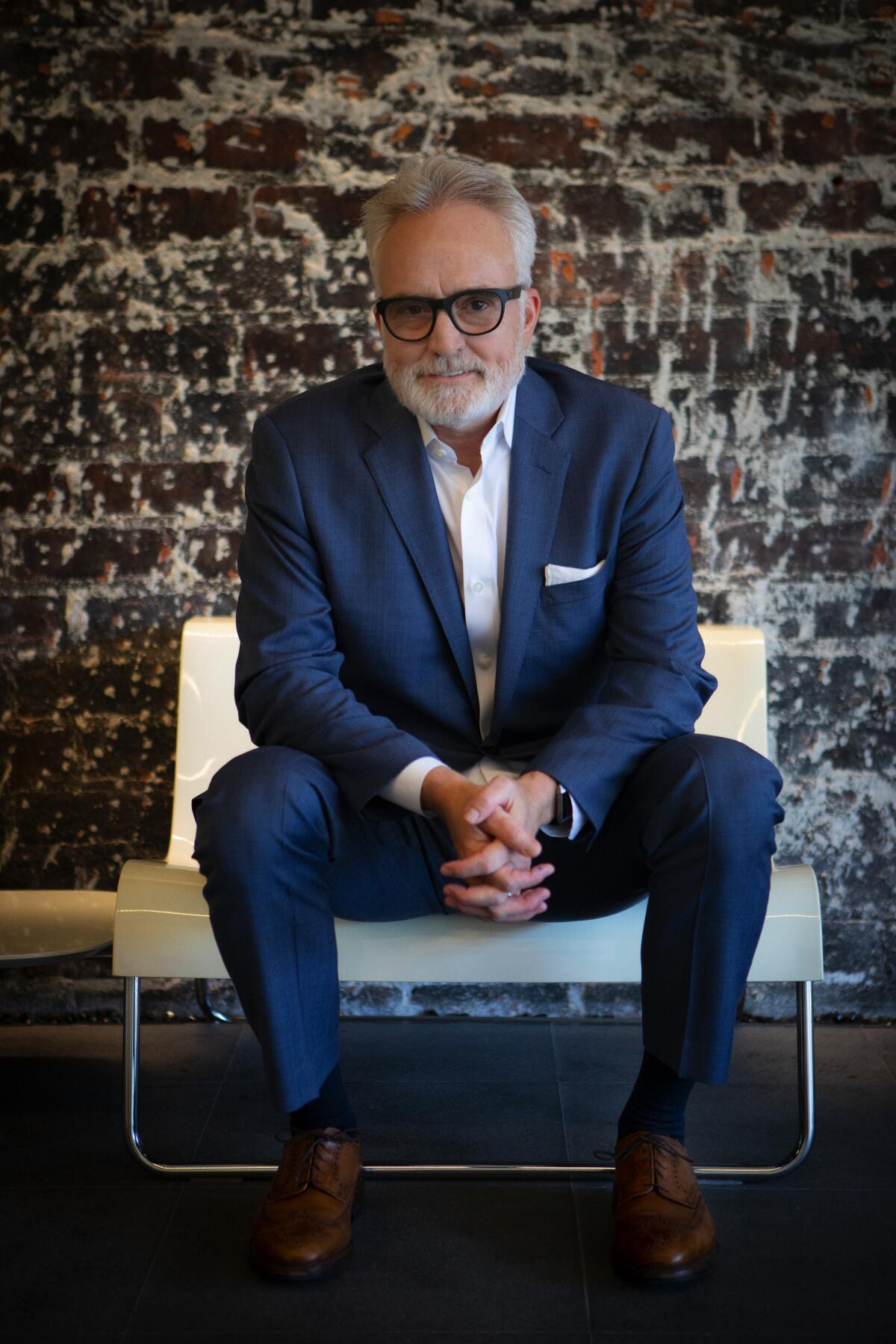Bradley Whitford, architect of disturbing dystopian future? Yes, and he sings too

- Share via
Bradley Whitford knows what you think of him: He’s Josh Lyman, the earnest deputy chief of staff on “The West Wing,” the role he played from 1999 to 2006 that earned him his first Emmy. (“It’s probably the first line in my obituary,” he quips.) But Whitford has aged into roles that showcase his range: as a singing choirmaster on NBC’s “Perfect Harmony” and a troubled architect of dystopia in Hulu’s “The Handmaid’s Tale” (which earned him his third Emmy last year). Zooming from home midquarantine, Whitford spoke with the Envelope about versatility, Clint Eastwood — and how his beliefs have guided his career choices.
Here’s the question of the hour: How are you coping in isolation?
There’s a kind of emotional volatility. I notice pendulum swings, which come from an existential threat none of us can control. Additionally, it amps up my political career, because I feel like we’re going through the Depression with Gary Busey as president. No offense to Gary Busey. It’s an unnerving time.
Are you taking it easy from home or working on projects?
I’m producing a documentary with the Duplass brothers [Mark and Jay] called “Not Going Quietly,” about the life of [healthcare activist and lawyer] Ady Barkan. We were going to have a big premiere at the Tribeca Film Festival, but ...

“Script-to-Screen” featurette “Postpartum”: A scene from “The Handmaid’s Tale” on Hulu.
”Perfect Harmony” and Hulu’s dystopian “The Handmaid’s Tale” are on opposite ends of the dramatic spectrum. How’d you get Hollywood to hire you for both strengths?
I realized when I was working with [“West Wing” creator] Aaron Sorkin’s writing, that as an actor, if you find yourself in a comedy you feel a relentless artificial responsibility to be funny every five seconds; in a drama you feel a relentless responsibility to be irony-free for an hour at a time. I look for things that mix those aspects of life up. “Handmaid’s” has been fascinating — it is dark. We shoot in Canada, and our crew is the stereotypically sweetest Canadian human beings on the planet. Then you’ll hear the assistant director say, “Eh, I don’t want to rush you, but we have to get the nooses on the girls.”

Bradley Whitford shows he still has some moves on “Perfect Harmony.”
As Arthur in “Harmony,” you’re getting a chance to sing a bit. Is that something you’ve been yearning to do your whole career?
I like singing. It scares me. And I realize the older I get the more I need to scare myself and stick my fingers into the fan.
What’s on TV Thursday, Dec. 12: ‘Perfect Harmony’ on NBC
You took a real left turn with the horror film “Get Out,” in which you’re like the alternate universe version of how Josh Lyman could have been. Did the success of that film change what roles you were offered?
For a long time, I played complete unredeemable punks in movies. But then you do “West Wing” and people are surprised you can do anything else. “Get Out” changed everything for me — it allowed me to get penetration into the culture to allow me a whole bunch of opportunities. The night I saw [the complete film] I was stunned; I’d never seen a soufflé rise like that.
At least one line seemed to be targeted directly at your “Wing” and public persona: the bit about how your character would have voted for President Obama for a third time. Was it?
I’m such a partisan hack that I didn’t even realize it was a joke at first. I think Jordan [Peele, director] threw that in there to mock me. It was a fun thing to have such a dark self-parody.
You grew up in a Quaker household; how did being a Friend affect the roles you took over the years?
I have complicated feelings about violence without consequences in movies, and I think that has something to do with being Quaker. Hollywood talks about the power of cinema to change the public conversation with films like “Schindler’s List” or “Get Out,” for that matter, yet the majority of the material in the movie business is violence as entertainment. I wrestle with this. And yet, look at Greek plays where they’re tearing their eyes out; or Shakespeare, whose most popular play was “Titus Andronicus” where people’s arms get hacked off. Violence is a distillation of conflict, and I have mixed feelings about the normalization of violence.
Were there ever parts you didn’t take because of it?
There are parts that are irony-deficient, full of gratuitous violence. I’m not interested in those. But I think about how in the early 1990s I did a film with Clint Eastwood [“A Perfect World”], and we’re on the set one day right after he’d won the Oscar for “Unforgiven,” and the paper says “Clint Eastwood’s Vision of America.” And I walked over to where he’s sitting with his heart beating like once every three minutes and said, “Did you see this?” And he said something like, “Vision for America? I used to work with an orangutan and now they think I’m Gandhi.” You take the best parts available. One blessing now is I am able to do the most interesting stuff.
Five seasoned entertainment journalists predict the shows and performances the Television Academy will honor with Emmys; do you agree with their picks?
More to Read
The complete guide to home viewing
Get Screen Gab for everything about the TV shows and streaming movies everyone’s talking about.
You may occasionally receive promotional content from the Los Angeles Times.






